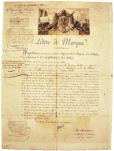“History teaches that wars begin when government believes the price of aggression is cheap.”
Ronald Reagan, Address to the nation, US Allies, and the Soviet Union, The White House, January 6, 1984
“To declare war, grant Letters of Marque and Reprisal, and make rules concerning captures on land and water;” Article 1 Section 8, Clause 11, US Constitution
Clause 11 can be divided into three separate powers that have been given to Congress. These are:
• Declare War Clause
• Marque and Reprisal Clause
• Captures Clause
Declare War Clause
Congress has the power to declare war. The President has the power to conduct war. This is an executive power vested in Article 2 of the Constitution. The President is the Commander-in-Chief of the armed forces. The President has the responsibility to repel sudden attacks or invasions as Commander-in-Chief. In 1863, the Supreme Court gave the opinion that the President “has no power to initiate or declare war,” but if there was an invasion, “the President is not only authorized but bound to resist force by force…without waiting for any special legislative authority.” (Prize Cases 1863) per John Yoo and James C. Ho, writing for Heritage Foundation.
Yoo and Ho further explain that in declaring war, the legal relationships between the warring nations are altered. The warring nations have certain rights, privileges, and protections under the laws of war. A declaration of war gives notice of the legal grounds of the war. It gives the enemy nations an opportunity to make amends and avoid the consequences of war.
Declarations of war usually cause other legal actions such as expulsion of enemy aliens, breaking diplomatic relationships, and confiscating the property of the enemy.
There have been five times when Congress has declared war. These are:
• War of 1812
• Mexican-American War 1846
• Spanish-American War 1898
• World War I
• World War II
In the case of the War of 1812, the Congress actually declared war. In the other four, Congress declared the existence of a state of war.
Congress has throughout history, authorized other hostilities, but not with a formal declaration of war.

Letter of marque given to Captain Antoine Bollo via the shipowner Dominique Malfino from Genoa, owner of the Furet, a 15-tonne privateer, 27 February 1809
Source: Wikipedia
Marque and Reprisal Clause
According to Wikipedia, a letter of marque and reprisal was a government license authorizing a person (known as a privateer) to attack and capture enemy vessels and bring them before admiralty courts for condemnation and sale. Cruising for prizes with a letter of marque was considered an honorable calling combining patriotism and profit, in contrast to unlicensed piracy, which was universally reviled.
A “letter of marque and reprisal” would involve permission to cross an international border to effect a reprisal (take some action against an attack or injury) authorized by an issuing jurisdiction to conduct reprisal operations outside its borders.
The Marque and Reprisal Clause plays little if any role in modern law since the United States has not issued a letter of marquee and reprisal since the War of 1812.
Captures Clause
The Capture Clause grants Congress the power to make rules for the confiscation, disposition, and distribution of captured enemy property. This clause does not apply to the capture on enemy persons. (Yoo and Ho)
Under Clause 11 of Article 1, Section 8, we the people give the authority to Congress to declare war and set up the rules for the capture of enemy property.
The benefit to we the people is assurance that after studying the facts, Congress, and only Congress, may declare war.
References:
http://en.wikipedia.org/wiki/Letter_of_marque
http://www.heritage.org/constitution/#!/articles/1/essays/49/declare-war
http://www.heritage.org/constitution/#!/articles/1/essays/50/marque-and-reprisal
http://www.heritage.org/constitution/#!/articles/1/essays/51/captures-clause
Findlay, Bruce Allyn and Findlay, Esther Blair. Your Rugged Constitution. Stanford: Stanford University Press, 1950
Hannaford, Peter. The Quotable Ronald Reagan. Washington, DC: Regnery Press, 1998
US Constitution


